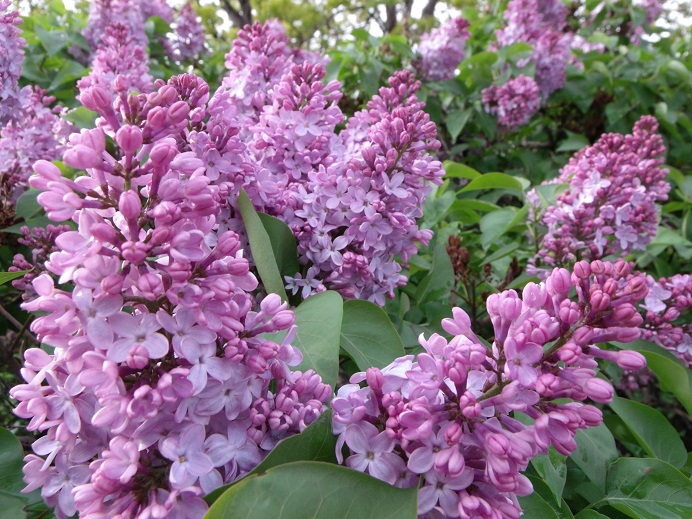| |
Lilac (Syringa vulgaris)

|
Lilac has been used in 19th century America as a vermifuge where it was effective in the elimination of intestinal worms and as a tonic anti-
periodic. It was also used in reducing the symptoms of fever, which allowed for quicker recovery from the virus that introduced the fever. The
plant arrived in England during the reign of King Henry VIII where it first appeared in print in an inventory conducted by Oliver Cromwell in
Norwich. It didn’t take long after that for the Lilac to gain popularity for the fragrance it produced and the medicinal benefits it contained.
The leaves and fruit of the Syringa vulgaris plant produce Lilac essential oil. Native to Eastern Europe and Persia, this oil has a refreshing
floral scent, that is elusive and is difficult to capture in a bottle. Syringa vulgaris does not yield its fragrance to distillation. The closest scent to
the natural is extracted by CO2 process, or other solvent extraction methods. The oil extracted is called "absolute" essential oil. It takes over
100,000 Lilac flowers to extract 1 kg of oil.
Lilac is a strong antibacterial agent, and it smells divine. These properties make it an ideal sterilizing agent that not only eliminates infection-
inducing bacteria, but also leaves your home smelling wonderful.
There is a number of health benefits associated with the use of Lilac including calming anxiety, reducing fever and as an effective treatment for
kidney disease. There are other claims that this product can be used to remedy various skin conditions including rashes, cuts, scrapes and
sunburn.
Lilac essential oil has potent antifungal properties that make it an effective agent for eliminating fungi from your skin and helps lower the risk
of fungal infections. It works against acne, rashes, eczema and psoriasis very effectively. Lilac helps treat Dandruff. The anti bacterial and anti
fungal properties of Lilac are very effective in preventing a lot of scalp related issues. It prevents helps to eliminate head lice. Lilac works very
effectively to reduce scalp inflammation and itching.
Lilac essential oil has potential benefits for your skin. It has proven astringent properties, which make it an effective skin tightening agent and
toner. The topical application of the oil helps reduce age lines and wrinkles. Lilac oil can help reduce skin sagging as well. Lilac essential oil
promotes glowing and healthy skin.
Lilac essential oil is an effective febrifuge, an agent that helps reduce fever and provides comfort from its effects.
Lilac essential oil has a characteristically sweet fragrance and can help ease anxiety and calm the mind. Lilac essential oil is used to relax
aromatherapy clients and induce harmonious mood. A few drops in a burner will assist in relieving symptoms of depression and anxiety. It is
as effective when diffused for inhalation which produces the same mental health benefits along with filling a room or home with a pleasant,
spring fresh scent. Lilac oil can be added to bath and a body product where it is has gained a great deal of usage when added to soaps, lotions,
and shampoos and conditioning products. It is added to these items simply to provide a comforting scent to the products. In addition, the scent
of Lilac essential oil makes it a perfect choice to include a few drops in cleaning products to add a refreshing scent throughout your home.
Lilac essential oil blends well with freesia, lily and lavender essential oils.
Warning: Do not use undiluted on skin. Do not take internally. Pregnant women and breast-feeding mothers should avoid this
product.
Disclaimer: The information presented herein is intended for educational purposes only. These statements have not been evaluated by the FDA and are not intended to diagnose, cure, treat or prevent disease. Individual results may vary, and before using any supplements, it is always advisable to consult with your own health care provider.
|
|


















